- Deep learning enabled IRS for 6G intelligent transportation systems June 24, 2022
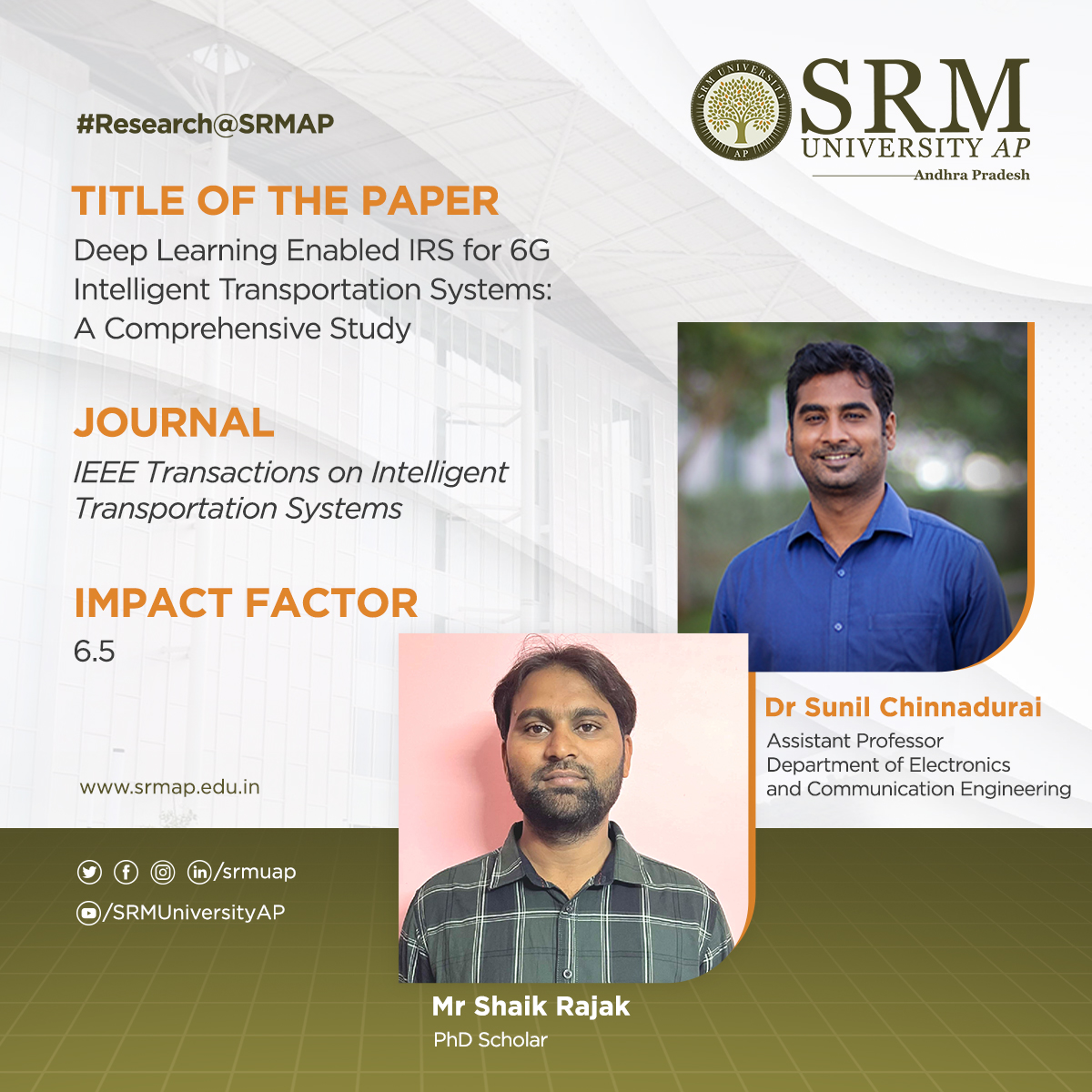
Intelligent Transportation System (ITS) is on its way to becoming the biggest player in the coming-of-age transportation system. However, the sheer demand for the enormous amount of data to secure seamless connectivity and functioning with maximum speed and safety tends to increase the power consumption of the ITS. Dr Sunil Chinnadurai and his PhD scholar Mr Shaik Rajak from the Department of Electronics and Communication Engineering present Intelligent Reflecting Surfaces (IRS) as the key enabling technology to provide the data required by the ITS with less power consumption.
Their article “Deep Learning Enabled IRS for 6G Intelligent Transportation Systems: A Comprehensive Study” which makes a comprehensive study on the DL-enabled IRS-aided ITS was published in the esteemed journal ‘IEEE Transactions on Intelligent Transportation Systems’ having an Impact factor of 6.5. The article elucidates the ways and means to overcome the channel estimation, secrecy rate, and energy efficiency optimisation problems.
The research suggests that connecting ITS to wireless networks via IRS will help in reaching the destination within the stipulated time duration with enhanced safety and comfort. Besides highlighting the reduced power consumption and hardware cost of the DL-enabled IRS-aided ITS, the article also projects that IRS usage in 6G-ITS massively helps the traffic control system to precisely send and receive the information of school buses as well as healthcare vehicles like ambulances, fire safety vehicles, etc. Their future research plans also include the experimental analysis of energy efficiency for wireless networks and Intelligent Transportation Systems with IRS.
Abstract of the Research
Intelligent Transportation Systems (ITS) play an increasingly significant role in our life, where safe and effective vehicular networks supported by sixth generation (6G) communication technologies are the essence of ITS. Vehicle-to-vehicle (V2V) and vehicle-to-infrastructure (V2I) communications need to be studied to implement ITS in a secure, robust, and efficient manner, allowing massive connectivity in vehicular communications networks. Besides, with the rapid growth of different types of autonomous vehicles, it becomes challenging to facilitate the heterogeneous requirements of ITS. To meet the above needs, intelligent reflecting surfaces (IRS) are introduced to vehicular communications and ITS, containing the reflecting elements that can intelligently configure incident signals from and to vehicles. As a novel vehicular communication paradigm at its infancy, it is key to understand the latest research efforts on applying IRS to 6G ITS as well as the fundamental differences with other existing alternatives and the new challenges brought by implementing IRS in 6G ITS. In this paper, we provide a big picture of deep learning enabled IRS for 6G ITS and appraise most of the important literature in this field. By appraising and summarizing the existing literature, we also point out the challenges and worthwhile research directions related to IRS aided 6G ITS.
- Twisted conjugacy in linear algebraic groups June 23, 2022
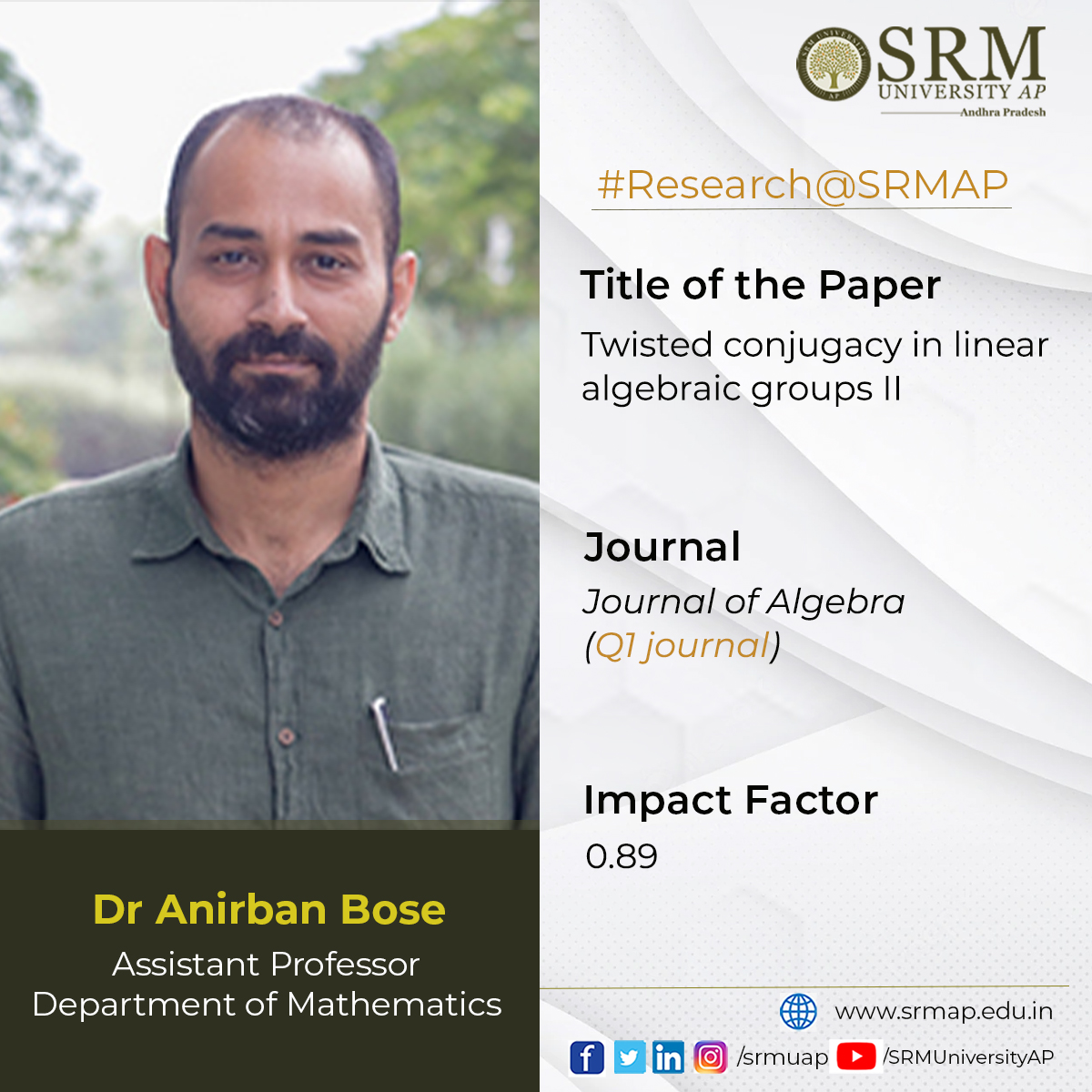
The Department of Mathematics is glad to announce that Dr Anirban Bose, Assistant Professor, has published an article, ‘Twisted conjugacy in linear algebraic groups II’ in the Q1 journal, Journal of Algebra. The paper was published in collaboration with Sushil Bhunia from Indian Institute of Science Education& Research, Mohali. The present work and its prequel “Twisted conjugacy in linear algebraic groups” are concerned with computing the number of orbits of a twisted conjugacy action of an algebraic group on itself. Dr Bose’s interests mainly lie studying the properties of groups of matrices.
Here’s the link to the article.
Continue reading → - Enhanced dynamic performance in DC-DC converter-PMDC motor combination June 22, 2022
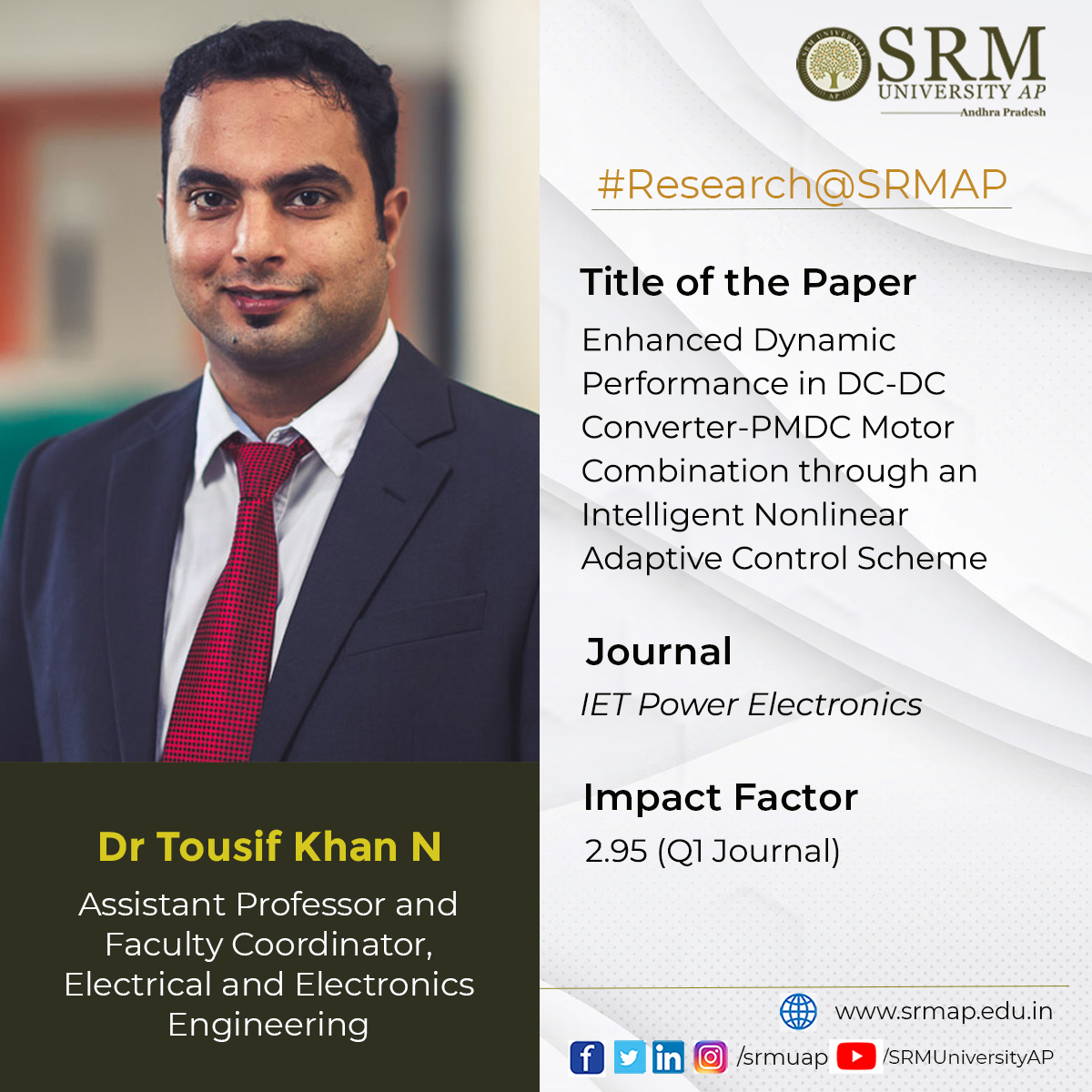 “Enhanced Dynamic Performance in DC-DC Converter-PMDC Motor Combination through an Intelligent Nonlinear Adaptive Control Scheme”, is the latest paper published by Dr Tousif Khan, Assistant Professor of EEE Department at SRM University-AP in the reputed IET Power Electronics (Q1 journal) having an Impact Factor of 2.95.
“Enhanced Dynamic Performance in DC-DC Converter-PMDC Motor Combination through an Intelligent Nonlinear Adaptive Control Scheme”, is the latest paper published by Dr Tousif Khan, Assistant Professor of EEE Department at SRM University-AP in the reputed IET Power Electronics (Q1 journal) having an Impact Factor of 2.95.Abstract
A novel neuro-adaptive control scheme is proposed in the context of angular velocity tracking in DC-DC buck converter-driven permanent magnet DC motor system. The controller builds upon the idea of backstepping control. The proposed method guarantees a rapid recovery of nominal angular velocity tracking under parametric and non-parametric uncertainties. In order to verify the performance of the proposed neuro-adaptive speed controller, extensive experimentation has been conducted in the laboratory under various real-time scenarios. Results are obtained for start-up, time-varying angular velocity tracking and under the influence of highly non-linear unknown load torque. The performance metrics such as peak undershoot/overshoot and settling time are computed to quantify the transient response behaviour. The results clearly substantiate theoretical propositions and demonstrate an enhanced dynamic speed tracking under a wide operating regime, thus confirming the suitability of the proposed method for fast industrial applications.
Continue reading → - Engineering the art of discovering similar song patterns June 22, 2022
The power of merging art with science is beyond our imagination. This amalgamation can pull off things that may seem insurmountable without the assistance of the other. Professor Hiren Deva Sarma, Guest faculty of the Department of Computer Science and Engineering, has developed a computational technique to find the similarity between the given songs in a pool. His paper titled An Approach to Discover Similar Musical Patterns has been published in IEEE ACCESS, a Q1 journal with an impact factor of 3.36.
Abstract
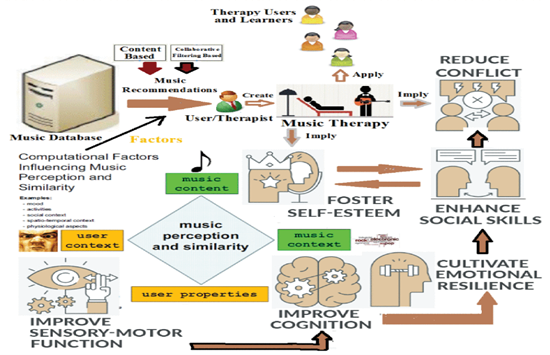 An algorithm has been developed to find the similarity between given songs. The song pattern similarity has been determined by knowing the note structures and the fundamental frequencies of each note of the two songs under consideration. The statistical concept, Correlation of Coefficient, is used in this work. The correlation of Coefficient is determined by applying the 16 Note-Measure Method. If the Correlation of Coefficient is near 1, it indicates that the patterns of the two songs under consideration are similar. Otherwise, there exists a certain percentage of similarity only. This basic principle is used in a set of Indian Classical Music (ICM) based songs. The proposed algorithm can determine the similarity between songs, so alternative songs in place of some well-known songs can be identified in terms of the embedded raga patterns. A digital music library has been constructed as a part of this work. The library consists of different songs, their raga name, and their corresponding healing capabilities in terms of music therapy. The proposed work may find application in the area of music therapy. Music therapy is an area of research that has been explored significantly in recent times. This work can also be exploited for developing an intelligent multimedia tool applicable in the healthcare domain. A multimedia-based mobile app has been developed encapsulating the abovementioned idea that can recommend alternative or similar songs to the existing ICM-based songs. This mobile app-based music recommendation system may be used for different purposes, including entertainment and healthcare. As a result of the applications of the proposed algorithm, similar songs in terms of raga patterns can be discovered from within the pool of a set of songs. A Music Recommendation System built on this algorithm can retrieve an alternative song from within the pool of songs as a replacement to a well-known song, which otherwise may be used for particular music therapy. Results are reported and analysed thoroughly. The future scope of the work is outlined.
An algorithm has been developed to find the similarity between given songs. The song pattern similarity has been determined by knowing the note structures and the fundamental frequencies of each note of the two songs under consideration. The statistical concept, Correlation of Coefficient, is used in this work. The correlation of Coefficient is determined by applying the 16 Note-Measure Method. If the Correlation of Coefficient is near 1, it indicates that the patterns of the two songs under consideration are similar. Otherwise, there exists a certain percentage of similarity only. This basic principle is used in a set of Indian Classical Music (ICM) based songs. The proposed algorithm can determine the similarity between songs, so alternative songs in place of some well-known songs can be identified in terms of the embedded raga patterns. A digital music library has been constructed as a part of this work. The library consists of different songs, their raga name, and their corresponding healing capabilities in terms of music therapy. The proposed work may find application in the area of music therapy. Music therapy is an area of research that has been explored significantly in recent times. This work can also be exploited for developing an intelligent multimedia tool applicable in the healthcare domain. A multimedia-based mobile app has been developed encapsulating the abovementioned idea that can recommend alternative or similar songs to the existing ICM-based songs. This mobile app-based music recommendation system may be used for different purposes, including entertainment and healthcare. As a result of the applications of the proposed algorithm, similar songs in terms of raga patterns can be discovered from within the pool of a set of songs. A Music Recommendation System built on this algorithm can retrieve an alternative song from within the pool of songs as a replacement to a well-known song, which otherwise may be used for particular music therapy. Results are reported and analysed thoroughly. The future scope of the work is outlined.Explanation of the research
A computational technique has been developed to identify a particular song similar to another in terms of its embedded raga pattern. Indian Classical Music (ICM) based songs are considered in this work. As a result of the application of the proposed technique, it is possible to identify similar songs in terms of their raga patterns from within a pool of songs. Subsequently, a similar alternative song can be recommended for different applications, including music therapy. If we consider music therapy, an alternative medicine (note: here, medicine is the song) is possible to recommend due to the proposed technique. This algorithm will find many applications in the domain of music information retrieval (MIR) and music recommendation systems (MRS).
Practical implementation of the research
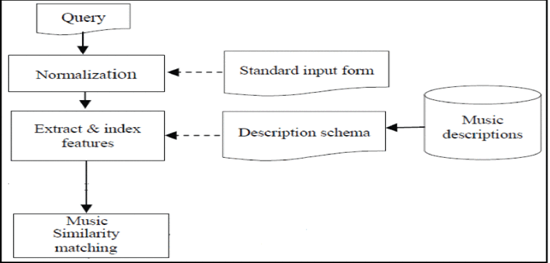 This algorithm may be applied in recommending music in music recommendation systems. Moreover, music information retrieval based on raga patterns can be an important domain where the proposed algorithm may be exploited. Considering the social implications, music therapy has been the intended area of the research; therefore, this algorithm has been developed considering numerous applications of music therapy based on Indian Classical Music. The music therapy community will be benefited from the proposed algorithm.
This algorithm may be applied in recommending music in music recommendation systems. Moreover, music information retrieval based on raga patterns can be an important domain where the proposed algorithm may be exploited. Considering the social implications, music therapy has been the intended area of the research; therefore, this algorithm has been developed considering numerous applications of music therapy based on Indian Classical Music. The music therapy community will be benefited from the proposed algorithm.In this research project, Professor Hiren Deva Sarma has collaborated with; Assistant Professor Sudipta Chakrabarty, Techno India, Salt Lake at the Department of Master of Computer Application; Mr Ruhul Islam, IT Consultant, Cloud Shine Global LLP; and Emil Pricop, Associate Professor in the Department of Automatic Control, Computers and Electronics, Petroleum-Gas University of Ploiesti, Romania.
In the future, the researchers look forward to exploring the music therapy capabilities of Indian Folk Music (IFM) like Kamrupia Lokgeet, Goalparia Lokgeet, and Baul Geet. Understanding the similarity and dissimilarity of the above-mentioned folk songs with Indian Classical Music (ICM) from computational musicology perspectives is another objective of the proposed research work. The researchers also aim to develop Music Recommendation Systems (i.e., applications) considering the songs mentioned above (ICM + IFM) and the different requirements of the users.
Continue reading → - Treading the path towards inner peace and freedom June 22, 2022
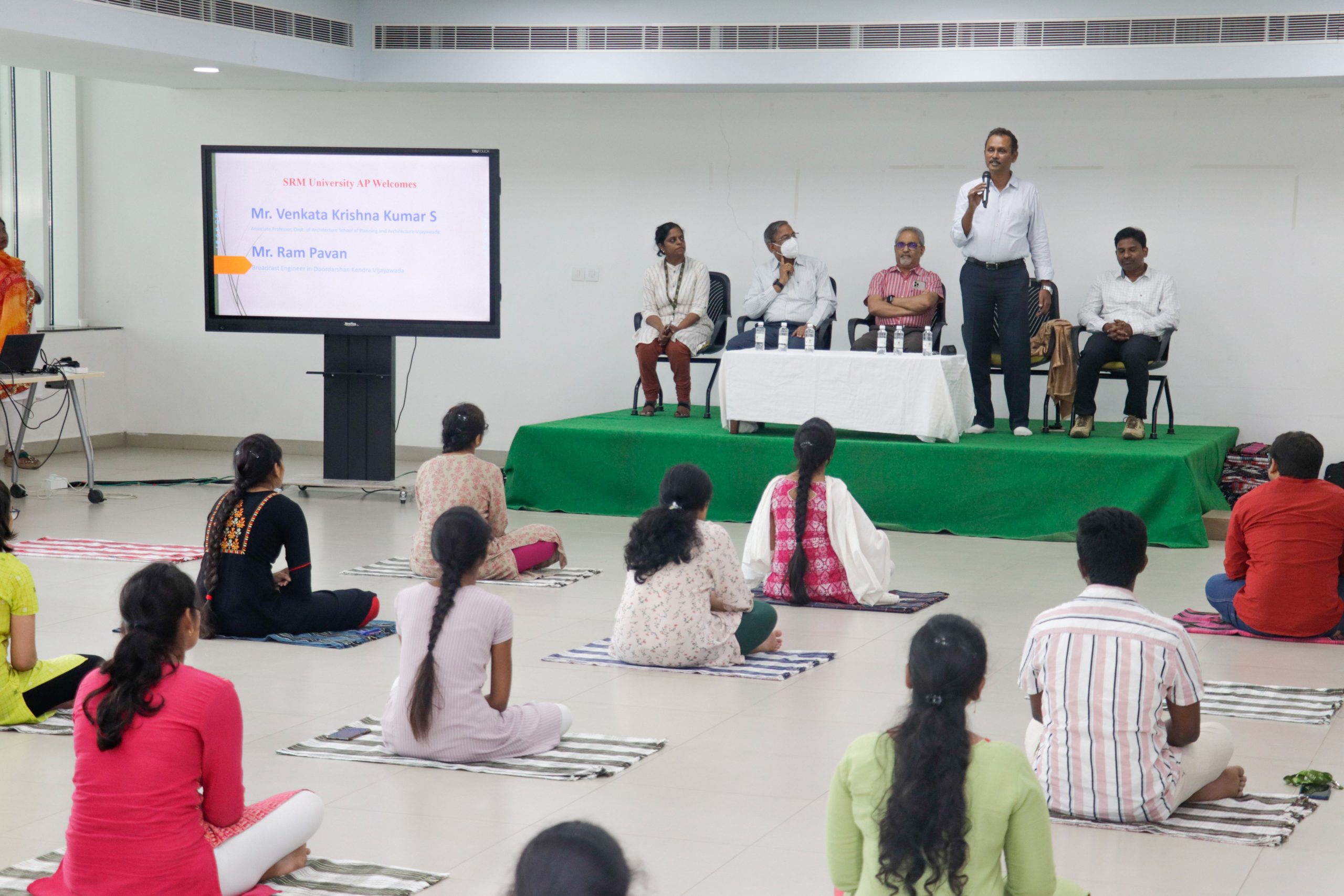
SRM University-AP celebrated International Yoga Day 2022 illuminating the vitality of practising yoga in the backdrop of the chaotic and disruptive scenario of the present times. Accomplished heartfulness practitioners Mr Venkata Krishna Kumar S and Mr Ram Pavan were the guests of honour of the day. Registrar Dr Prem Kumar, and Dean-SEAS Prof B V Babu, welcomed and felicitated the invitees.
Prof B V Babu addressed the gathering and expounded on the significance of Yoga. He highlighted the power of yoga in activating the connection between body, mind, and soul. Essentially, it is the lack of unison between these elements, which leads to a confused and disorganised self. He exhorted the students to make yoga an indispensable part of their lives to discover their higher selves.
Mr Venkata Krishna Kumar interacted with the students and rendered an edifying lecture on the true meaning and benefits of yoga. Emphasising the theme of this year’s yoga day, ‘Yoga for Humanity’, he spelt out how the word ‘unity’ is already embedded in humanity. The unrest and anarchy broken out across different parts of the world is undeniably a consequence of the absence of this unity. He expressed how yoga would help one to rise to a higher level of consciousness and unite with the world around.
He also focused on yoga’s power in liberating the mind from all meaningless entanglements and thoughts. Students were also made to meditate and reflect on all random thoughts that cropped up in their minds. Yoga is not just about physical exertion and regulating bodily functions. It fundamentally aims at bringing the mind under control and emancipating it from all worldly distress.
The session was presided over by Mr Ram Pavan. He shed light on different aspects of yoga and explained how it helps in exploring and purifying our consciousness. He also demystified the essence of heartfulness meditation and implored the students to practise meditation. Ms Revathi Balakrishnan, Assistant Director, Student Affairs, proposed the vote of thanks. The guests of honour were presented with mementoes as a token of gratitude for gracing the celebrations with their invaluable presence.
Continue reading →

